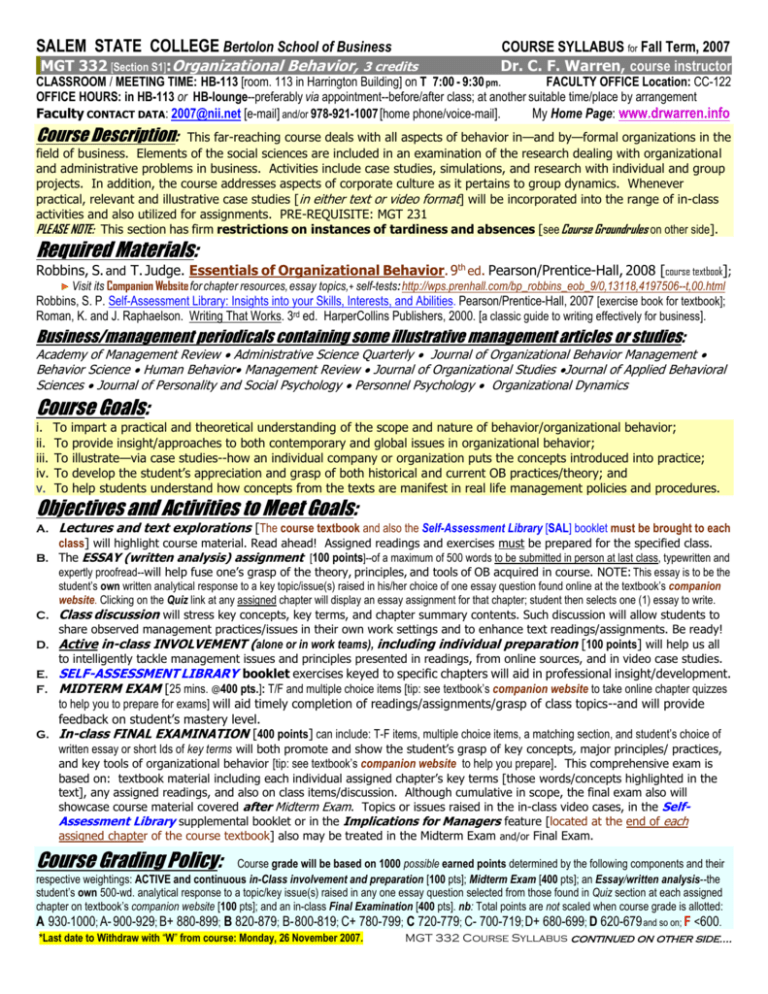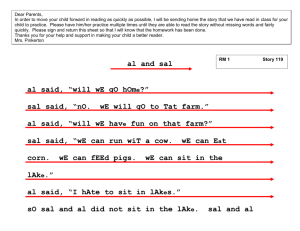
SALEM STATE COLLEGE Bertolon School of Business
COURSE SYLLABUS for Fall Term, 2007
Dr. C. F. Warren, course instructor
MGT 332 [Section S1]:Organizational Behavior, 3 credits
CLASSROOM / MEETING TIME: HB-113 [room. 113 in Harrington Building] on T 7:00 - 9:30 pm.
FACULTY OFFICE Location: CC-122
OFFICE HOURS: in HB-113 or HB-lounge--preferably via appointment--before/after class; at another suitable time/place by arrangement
Faculty CONTACT DATA: 2007@nii.net [e-mail] and/or 978-921-1007 [home phone/voice-mail].
My Home Page: www.drwarren.info
Course Description:
This far-reaching course deals with all aspects of behavior in—and by—formal organizations in the
field of business. Elements of the social sciences are included in an examination of the research dealing with organizational
and administrative problems in business. Activities include case studies, simulations, and research with individual and group
projects. In addition, the course addresses aspects of corporate culture as it pertains to group dynamics. Whenever
practical, relevant and illustrative case studies [in either text or video format] will be incorporated into the range of in-class
activities and also utilized for assignments. PRE-REQUISITE: MGT 231
PLEASE NOTE: This section has firm restrictions on instances of tardiness and absences [see Course Groundrules on other side].
Required Materials:
Robbins, S. and T. Judge. Essentials of Organizational Behavior. 9th ed. Pearson/Prentice-Hall, 2008 [course textbook];
►Visit its Companion Website for chapter resources, essay topics, + self-tests: http://wps.prenhall.com/bp_robbins_eob_9/0,13118,4197506--t,00.html
Robbins, S. P. Self-Assessment Library: Insights into your Skills, Interests, and Abilities. Pearson/Prentice-Hall, 2007 [exercise book for textbook];
Roman, K. and J. Raphaelson. Writing That Works. 3rd ed. HarperCollins Publishers, 2000. [a classic guide to writing effectively for business].
Business/management periodicals containing some illustrative management articles or studies:
Academy of Management Review Administrative Science Quarterly Journal of Organizational Behavior Management
Behavior Science Human Behavior Management Review Journal of Organizational Studies Journal of Applied Behavioral
Sciences Journal of Personality and Social Psychology Personnel Psychology Organizational Dynamics
Course Goals:
i.
ii.
iii.
iv.
v.
To impart a practical and theoretical understanding of the scope and nature of behavior/organizational behavior;
To provide insight/approaches to both contemporary and global issues in organizational behavior;
To illustrate—via case studies--how an individual company or organization puts the concepts introduced into practice;
To develop the student’s appreciation and grasp of both historical and current OB practices/theory; and
To help students understand how concepts from the texts are manifest in real life management policies and procedures.
Objectives and Activities to Meet Goals:
A. Lectures and text explorations [The course textbook and also the Self-Assessment Library [SAL] booklet must be brought to each
class] will highlight course material. Read ahead! Assigned readings and exercises must be prepared for the specified class.
B. The ESSAY (written analysis) assignment [100 points]--of a maximum of 500 words to be submitted in person at last class, typewritten and
expertly proofread--will help fuse one’s grasp of the theory, principles, and tools of OB acquired in course. NOTE: This essay is to be the
student’s own written analytical response to a key topic/issue(s) raised in his/her choice of one essay question found online at the textbook’s companion
website. Clicking on the Quiz link at any assigned chapter will display an essay assignment for that chapter; student then selects one (1) essay to write.
C. Class discussion will stress key concepts, key terms, and chapter summary contents. Such discussion will allow students to
share observed management practices/issues in their own work settings and to enhance text readings/assignments. Be ready!
D. Active in-class INVOLVEMENT (alone or in work teams), including individual preparation [100 points] will help us all
to intelligently tackle management issues and principles presented in readings, from online sources, and in video case studies.
E. SELF-ASSESSMENT LIBRARY booklet exercises keyed to specific chapters will aid in professional insight/development.
F. MIDTERM EXAM [25 mins. @400 pts.]: T/F and multiple choice items [tip: see textbook’s companion website to take online chapter quizzes
to help you to prepare for exams] will aid timely completion of readings/assignments/grasp of class topics--and will provide
feedback on student’s mastery level.
G. In-class FINAL EXAMINATION [400 points] can include: T-F items, multiple choice items, a matching section, and student’s choice of
written essay or short Ids of key terms will both promote and show the student’s grasp of key concepts, major principles/ practices,
and key tools of organizational behavior [tip: see textbook’s companion website to help you prepare]. This comprehensive exam is
based on: textbook material including each individual assigned chapter’s key terms [those words/concepts highlighted in the
text], any assigned readings, and also on class items/discussion. Although cumulative in scope, the final exam also will
showcase course material covered after Midterm Exam. Topics or issues raised in the in-class video cases, in the SelfAssessment Library supplemental booklet or in the Implications for Managers feature [located at the end of each
assigned chapter of the course textbook] also may be treated in the Midterm Exam and/or Final Exam.
Course Grading Policy:
Course grade will be based on 1000 possible earned points determined by the following components and their
respective weightings: ACTIVE and continuous in-Class involvement and preparation [100 pts]; Midterm Exam [400 pts]; an Essay/written analysis--the
student’s own 500-wd. analytical response to a topic/key issue(s) raised in any one essay question selected from those found in Quiz section at each assigned
chapter on textbook’s companion website [100 pts]; and an in-class Final Examination [400 pts]. nb: Total points are not scaled when course grade is allotted:
A 930-1000; A- 900-929; B+ 880-899; B 820-879; B- 800-819; C+ 780-799; C 720-779; C- 700-719; D+ 680-699; D 620-679 and so on; F <600.
*Last date to Withdraw with “W” from course: Monday, 26 November 2007.
MGT 332 Course Syllabus continued on other side….
Schedule of Assignments for MGT 332:
CONSULT: Learning Objectives [the gray-shaded box--containing numbered objectives--on the first page of each assigned chapter]; Key Terms [those words
or concepts highlighted within the text of each assigned chapter]; Implications for Managers [the gray-shaded box at the end of each assigned chapter];
Epilogue of textbook; Glindex [pp. 311-24]. VIEW ONLINE at textbook’s companion website these features for each assigned chapter: Learning Objectives;
Quizzes (T/F + multiple choice); Student PowerPoints. SUBSCRIBE (optional) at: www.vangonotes.com to downloadable audio chapter reviews in MP3 format.
PART I: PROLOGUE/INTRODUCTION TO ORGANIZATIONAL BEHAVIOR:
11 SEP--Course overview: Groundrules, Policies, and course Grading. Also, note (below and elsewhere on this syllabus) the following 3 items:
[1] SELF-ASSESSMENT LIBRARY booklet (SAL) contains self-administered/self-scoring diagnostic tests (instruments) designed to reveal to the student
how his/her own skill sets or perspectives rank when compared with others. Each selected exercise is keyed to a major topic/issue raised in a given
chapter; as such, student must read that chapter BEFORE taking the “test.” COMPLETED SAL exercises are due at class on date indicated.
[2] ESSAY/ WRITTEN ANALYSIS [typed, 500-words] of one essay question found online at textbook’s companion website is due at last class (see B.).
[3] VIDEO cases sometimes are shown/discussed in class: each scheduled video will correspond to certain major topics/issues raised in a given chapter of
the textbook. Background and related discussion questions will be furnished at class prior to each viewing! Students first must read/know chapter contents.
Chapter 1: Introduction to Organizational Behavior and Management, pp. 1-13.
PART II: THE INDIVIDUAL IN THE ORGANIZATION:
18 SEP---Chapter 2: Foundations of Organizational Behavior, pp. 14-32; SAL: complete exercise I.B.3 for this class.
25 SEP---Chapter 3: Personality and Values, pp. 33-50; SAL: complete exercise I.A.4 for this class. ►PART II video case: Gender Wage Gap (values), 614.
02 OCT--Chapter 4: Perception and Individual Decision-making, pp. 51-68; SAL: I.D.1
09 OCT--Chapter 6: Motivation: From Concepts to Applications, pp. 89-106; SAL: I.B.2.
16 OCT--Chapter 7: Emotions and Moods, pp. 107-22; SAL: I.E.1.
PART III: GROUPS IN THE ORGANIZATION:
23 OCT--Midterm Exam (on Parts I and II only). Also for this class meeting, read/thoroughly prepare to discuss intelligently...
Chapter 8: Foundations of Group Behavior, p. 123-39.
30 OCT--Chapter 9: Understanding Work Teams, p. 140-57; SAL: II.B.6.
06 NOV--Chapter 10: Communication, pp. 158-74;. SAL: II.A.2 ► PART III video case: E-mail Code (communication), 624.
13 NOV--Chapter 12: Power and Politics, pp. 197-210; SAL: II.C.3
20 NOV--Chapter 13: Conflict and Negotiation, pp 211-28; SAL: II.C.6.
*Deadline for Withdrawal (with “W”) from this course is 26 Nov. 2007.
PART IV: THE ORGANIZATION SYSTEM:
27 NOV--Chapter 14: Foundations of Organization Structure, pp. 229-246; SAL: III.A.1.
04 DEC--Chapter 15: Organizational Culture, pp. 247-63. SAL: III.B.1. ►PART IV video case: Army Boot Camp (organizational culture), 631.
11 DEC--Chapter 16: Organizational Change and Development, pp. 264-80; SAL: III.C.1.
18 DEC---In-class FINAL EXAMINATION [cumulative, but will stress since Midterm--see description on syllabus]. Your typed+ proofread Analytical Essay is DUE.
*Last date to Withdraw with “W” from course: Monday, 26 November 2007; consult Registrar’s Office ( 978-542-6300).
.
Course Groundrules/Instructor’s Expectations of students enrolled in MGT 332:
1.
2.
Punctuality, a minimum of 3 hours preparation, and attendance are expected minimally of each student for each entire class meeting.
WARNING: Course credit not given if student is absent [for ANY reason, even illness], severely tardy¹ and/or leaves class early² more than TWICE.
3.
4.
5.
Internet, early, “slid under the office door,” and “left in faculty mailbox” submittals of assignments (or any student work) are not allowed;
¹severe tardiness [i.e., late 30 minutes] or ²leaving a class early [i.e., with ,60 minutes remaining].
6.
7.
8.
9.
10.
11.
12.
13.
14.
Readings/written assignments are due in person at class on date indicated; an assignment is late if it is not done or handed in at class meeting on due date!
For each such instance, the student incurs a 10 point loss for being: [a] unprepared (or under-prepared) for any class meeting;
[b] absent or severely tardy more than once; or
[c] late (for any reason, including absence or illness) with any assignment.
Make-up exams are not given for any reason, including illness [O points are awarded for any missed quiz, exam, or assignment].
A College-declared class meeting cancellation [storms, etc.] will result in a make-up session that student must attend.
Originals of submitted assignments/case study will be kept by Instructor; so, please make copies! All exams/papers are retained by Instructor.
Plagiarism, whether deliberate or unintentional in nature, will result in course failure and can bring removal from the College.
Cellphone, PDA, and/or pager usage is not permitted during the class meeting or anywhere in the classroom at any time. PLEASE!
The student is liable for all that goes on in class and for obtaining/doing assignments—whether or not s/he is in the classroom at the time.
Your absence / tardiness record for this course also affects those points earned by you for ACTIVE In-Class Involvement and Preparation.
Textbook [and any relevant study aids] must be brought to--and utilized by the student at--each class meeting.
ASAP, please notify instructor by e-mail/voice-mail/or in class of any planned (recent) absence, tardiness, or office visit.
College Policy Statements: ■ Salem State College assumes that all students come to the College with serious educational intent and expects them to be mature
responsible individuals who exhibit high standards of honesty and personal conduct in their academic life. All forms of academic dishonesty are serious offenses
against the College community. Salem State College will apply sanctions when student conduct interferes with the College’s primary educational objectives.
■ Salem State College is committed to providing equal access to the educational experience for all students in compliance with Section 504 of the Rehabilitation Act and the
Americans with Disabilities Act and to providing all reasonable academic accommodations, aids, and adjustments. Any student who has a documented disability requiring
an accommodation, aid, or adjustment should speak immediately with the instructor--so that appropriate provisions can be made. Students with disabilities [who have not
previously done so] should provide documentation to—and schedule an appointment with—the Office for Students with Disabilities to obtain appropriate services.


![Submission 68 [doc]](http://s3.studylib.net/store/data/008000926_1-fed8eecce2c352250fd5345b7293db49-300x300.png)


